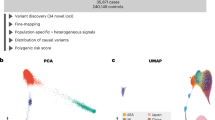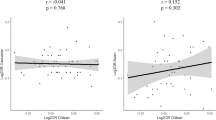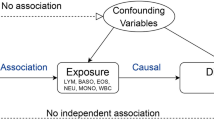Abstract
Genome-wide association studies (GWAS) have uncovered numerous susceptibility genes for rheumatoid arthritis (RA) in patients of European, Asian and other ethnic ancestries. Although previous transethnic GWAS meta-analyses enabled the identification of several novel loci, the genetic heterogeneity observed in the PADI4 and PTPN22 genes suggests that ethnic variation should be considered. In addition, the effects of genetic polymorphisms on gene expression profiles are important when assessing the association of genetic information with disease pathogenesis and will influence the development of personalized medicine. Gene expression is controlled by epigenetic modifications, which in turn can be affected by environmental stimuli. Altogether, genetic and epigenetic information of Asian populations will contribute considerably to future rheumatology research.
This is a preview of subscription content, access via your institution
Access options
Subscribe to this journal
Receive 12 print issues and online access
$209.00 per year
only $17.42 per issue
Buy this article
- Purchase on Springer Link
- Instant access to full article PDF
Prices may be subject to local taxes which are calculated during checkout



Similar content being viewed by others
References
Smolen, J. S. et al. Treating rheumatoid arthritis to target: recommendations of an international task force. Ann. Rheum. Dis. 69, 631–637 (2010).
Cavagna, L. et al. The multifaceted aspects of interstitial lung disease in rheumatoid arthritis. Biomed. Res. Int. 2013, 759760 (2013).
National Institutes of Health. A catalog of published genome-wide association studies [online], (2014).
Marigorta, U. M. & Navarro, A. High trans-ethnic replicability of GWAS results implies common causal variants. PLoS Genet. 9, e1003566 (2013).
Suzuki, A. et al. Functional haplotypes of PADI4, encoding citrullinating enzyme peptidylarginine deiminase 4, are associated with rheumatoid arthritis. Nat. Genet. 34, 365–402 (2003).
Okada, Y. et al. Genetics of rheumatoid arthritis contributes to biology and drug discovery. Nature 506, 376–381 (2014).
Stahl, E. A. et al. Genome-wide association study meta-analysis identifies seven new rheumatoid arthritis risk loci. Nat. Genet. 42, 508–514 (2010).
Kochi, Y. et al. PADI4 polymorphism predisposes male smokers to rheumatoid arthritis. Ann. Rheum. Dis. 70, 512–515 (2011).
Mori, M., Yamada, R., Kobayashi, K., Kawaida, R. & Yamamoto, K. Ethnic differences in allele frequency of autoimmune-disease-associated SNPs. J. Hum. Genet. 50, 264–266 (2005).
Ramos, P. S., Shaftman, S. R., Ward, R. C. & Langefeld, C. D. Genes associated with SLE are targets of recent positive selection. Autoimmune Dis. 2014, 203435 (2014).
Okada, Y. et al. Meta-analysis identifies nine new loci associated with rheumatoid arthritis in the Japanese population. Nat. Genet. 44, 511–516 (2012).
Stahl, E. A. et al. Bayesian inference analyses of the polygenic architecture of rheumatoid arthritis. Nat. Genet. 44, 483–489 (2012).
Kurreeman, F. A. et al. Use of a multiethnic approach to identify rheumatoid- arthritis-susceptibility loci, 1p36 and 17q12. Am. J. Hum. Genet. 90, 524–532 (2012).
Plenge, R. M., Scolnick, E. M. & Altshuler, D. Validating therapeutic targets through human genetics. Nat. Rev. Drug Discov. 12, 581–594 (2013).
Wakitani, S. et al. The homozygote of HLA-DRB1*0901, not its heterozygote, is associated with rheumatoid arthritis in Japanese. Scand. J. Rheumatol. 27, 381–382 (1998).
Lee, H. S. et al. Increased susceptibility to rheumatoid arthritis in Koreans heterozygous for HLA-DRB1*0405 and *0901. Arthritis Rheum. 50, 3468–3475 (2004).
Kong, K. F., Yeap, S. S., Chow, S. K. & Phipps, M. E. HLA-DRB1 genes and susceptibility to rheumatoid arthritis in three ethnic groups from Malaysia. Autoimmunity 35, 235–239 (2002).
Kochi, Y. et al. Analysis of single-nucleotide polymorphisms in Japanese rheumatoid arthritis patients shows additional susceptibility markers besides the classic shared epitope susceptibility sequences. Arthritis Rheum. 50, 63–71 (2004).
Raychaudhuri, S. et al. Five amino acids in three HLA proteins explain most of the association between MHC and seropositive rheumatoid arthritis. Nat. Genet. 44, 291–296 (2012).
Okada, Y. et al. Risk for ACPA-positive rheumatoid arthritis is driven by shared HLA amino acid polymorphisms in Asian and European populations. Hum. Mol. Genet. 23, 6916–6926 (2014).
Shimane, K. et al. An association analysis of HLA-DRB1 with systemic lupus erythematosus and rheumatoid arthritis in a Japanese population: effects of *09:01 allele on disease phenotypes. Rheumatology (Oxford) 52, 1172–1182 (2013).
Okada, Y. et al. HLA-DRB1*0901 lowers anti-cyclic citrullinated peptide antibody levels in Japanese patients with rheumatoid arthritis. Ann. Rheum. Dis. 69, 1569–1570 (2010).
Scally, S. W. et al. A molecular basis for the association of the HLA-DRB1 locus, citrullination, and rheumatoid arthritis. J. Exp. Med. 210, 2569–2582 (2013).
Freed, B. M., Schuyler, R. P. & Aubrey, M. T. Association of the HLA-DRB1 epitope LA(67, 74) with rheumatoid arthritis and citrullinated vimentin binding. Arthritis Rheum. 63, 3733–3739 (2011).
Jiang, L. et al. Novel risk loci for rheumatoid arthritis in Han Chinese and congruence with risk variants in Europeans. Arthritis Rheumatol. 66, 1121–1132 (2014).
Barreiro, L. B. & Quintana-Murci, L. From evolutionary genetics to human immunology: how selection shapes host defence genes. Nat. Rev. Genet. 11, 17–30 (2010).
Myouzen, K. et al. Functional variants in NFKBIE and RTKN2 involved in activation of the NF-κB pathway are associated with rheumatoid arthritis in Japanese. PLoS Genet. 8, e1002949 (2012).
Bengsch, B. et al. Human TH17 cells express high levels of enzymatically active dipeptidylpeptidase IV (CD26). J. Immunol. 188, 5438–5447 (2012).
Stahl, E. A. et al. Bayesian inference analyses of the polygenicarchitecture of rheumatoid arthritis. Nat. Genet. 44, 483–489 (2012).
Jiang, Y., Epstein, M. P. & Conneely, K. N. Assessing the impact of population stratification on association studies of rare variation. Hum. Hered. 76, 28–35 (2013).
Dubois, P. C. et al. Multiple common variants for celiac disease influencing immune gene expression. Nat. Genet. 42, 295–302 (2010).
Lee, J. C. et al. Human SNP links differential outcomes in inflammatory and infectious disease to a FOXO3-regulated pathway. Cell 155, 57–69 (2013).
Trynka, G. et al. Chromatin marks identify critical cell-types for fine-mapping complex trait variants. Nat. Genet. 45, 124–130 (2013).
Author information
Authors and Affiliations
Contributions
Y.O. contributed substantially to the discussion of content. K.Y., A.S. and Y.K. reviewed and edited the manuscript before submission. All authors wrote the manuscript.
Corresponding author
Ethics declarations
Competing interests
The authors declare no competing financial interests.
Supplementary information
Supplementary Table 1
Results of previously reported GWAS of rheumatoid arthritis performed in Asian populations (DOCX 24 kb)
Rights and permissions
About this article
Cite this article
Yamamoto, K., Okada, Y., Suzuki, A. et al. Genetics of rheumatoid arthritis in Asia—present and future. Nat Rev Rheumatol 11, 375–379 (2015). https://doi.org/10.1038/nrrheum.2015.7
Published:
Issue Date:
DOI: https://doi.org/10.1038/nrrheum.2015.7
This article is cited by
-
Entering the era of precision medicine through multiomics approach
Inflammation and Regeneration (2022)
-
TGFB1 (rs1800470 and rs1800469) variants are independently associated with disease activity and autoantibodies in rheumatoid arthritis patients
Clinical and Experimental Medicine (2022)
-
Tofacitinib for the treatment of rheumatoid arthritis: a real-world study in China
Internal and Emergency Medicine (2022)
-
Microbiome–miRNA interactions in the progress from undifferentiated arthritis to rheumatoid arthritis: evidence, hypotheses, and opportunities
Rheumatology International (2021)
-
Genomics, transcriptomics and proteomics to elucidate the pathogenesis of rheumatoid arthritis
Rheumatology International (2017)



